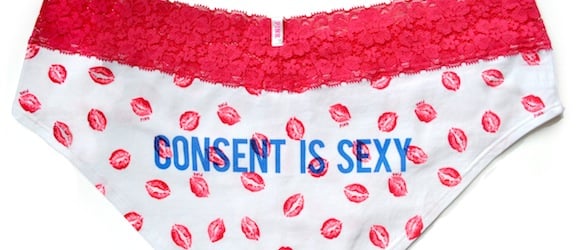I’d known that Victoria’s Secret had been targeted lately by a group called FORCE: Upsetting Rape Culture lately, although “targeted” is perhaps a strong word for “creating a parody marketing campaign designed to bring attention the idea of enthusiastic consent” (which involved sending press releases, creating a fake website, and seeding actual panties with pro-consent slogans in a few actual Victoria’s Secret stores), and allowing folks who didn’t look too deeply into it to believe that it was a genuine move by VS itself for about 24 hours, until the group announced their real identity. What I didn’t know was that instead of gently acknowledging, simply ignoring, or otherwise letting alone a campaign that pokes some very pointed fun at the company, Victoria’s Secret slapped FORCE’s web presence with a DMCA takedown during the most pivotal part of their campaign.
The Electronic Frontier Foundation describes the effect of VS’s actions:
Though nothing was down for long—the site was only down briefly as FORCE moved to a different hosting provider and the Twitter account was back up by Friday, December 7—even the brief downtime hurt the campaign. FORCE had purposefully launched PINK Loves CONSENT immediately prior to the fashion show to capitalize on the publicity surrounding the event, which attracted nearly 10 million viewers. During the show, tweets about body acceptance and the importance of normalizing a culture of enthusiastic consent made #loveconsent the number one hashtag associated with #victoriassecret. The Facebook page was similarly inundated. FORCE was able to use Victoria’s Secret’s popularity to raise awareness and generate discussion about rape culture on an unprecedented level. When its Twitter account and subsequently its websites were taken down, that discussion was interrupted at a vital time.
I’ll admit that FORCE’s fake website is pretty convincing, and is clearly intended to fool the unwary viewer. Depressingly, probably the first tip that this isn’t an official Victoria’s Secret site is the presence of plus-sized models. The final one is the fact that you can’t actually buy any of the clothing being modeled on the site: there’s no cart, checkout, or even individual item pages. It’s simply not a retail site. But that’s partly why VS’s actions seemed so counter intuitive. FORCE isn’t horning in on their share of the lingerie market, nor is it profiting off the popularity of the VS name. Instead, it’s using that popularity to bring attention to a political agenda. Certainly, one of the purposes of trademark laws is to keep others from associating your intellectual property with political messages you don’t support.
However, Victoria’s Secret is no stranger to controversy, whether the company is making missteps with race, cultural appropriation, or body image. In a best case scenario they would have looked at the buzz FORCE’s campaign was generating on Twitter, recognized that they weren’t losing any money from their efforts, and worked with the group to put out a real line of underwear, perhaps even with proceeds going to womens’ shelters. If they didn’t want their brand associated with promoting consent, or felt that they’d been slighted by the parody campaign, the reaction that reflects least poorly on the company is to refuse to comment on FORCE’s activities… not to try and mess them up at exactly the worst moment.
For more on how the DMCA makes it very easy for companies to censor political speech on the internet, I recommend the full article at the Electronic Frontier Foundation.
(via Boing Boing.)








Published: Dec 18, 2012 02:01 pm